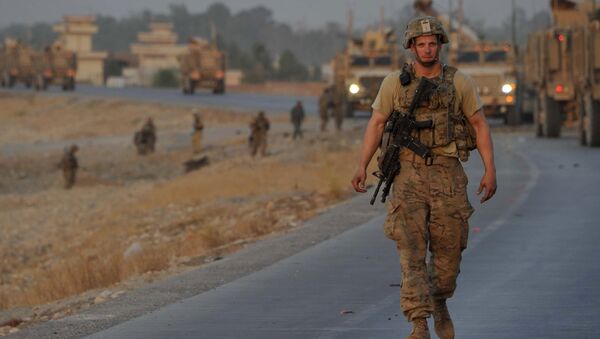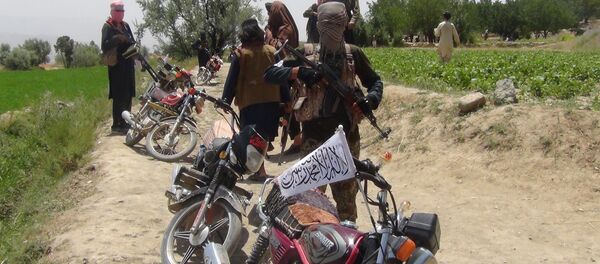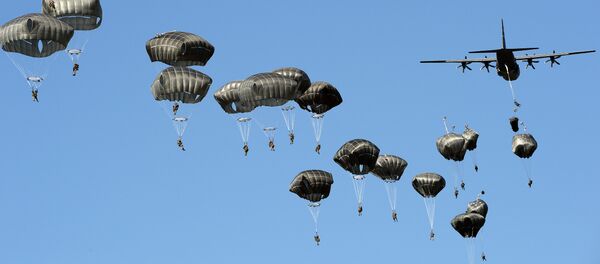MOSCOW (Sputnik) — The recently announced increase of NATO troops in Afghanistan is unlikely to change the overall course of the conflict in the country or contribute to defeating the Taliban (outlawed in Russia), analysts told Sputnik.
The increase was initially announced by NATO Secretary General Jens Stoltenberg, who said that the number of troops in its Resolute Support mission would be boosted from about 13,000 to roughly 16,000. The mission will not "go back to combat operations," and the additional troops will enhance NATO’s training and assistance functions in cooperation with the Afghan forces, the NATO chief explained.
NATO's decision follows August's announcement by US President Donald Trump to introduce a new US strategy in its 16-year-long war in Afghanistan. Changes provided in the strategy included lifting restrictions on the US forces to attack the Taliban (a terrorist group outlawed in Russia) and other militant formations in Afghanistan which had been previously imposed by administration of ex-US President Barack Obama.
Sixteen Years Without Solving the Problem
Arif Rafiq, a non-resident fellow at the US-based Middle East Institute think tank and a fellow at the Center for Global Policy, told Sputnik that by the decision to increase the number of troops in Afghanistan Washington’s NATO allies were responding to both the pressure from the Trump administration to share the burden of military expenses in Afghanistan and to the deteriorating security situation in the country.
"However, a marginal increase in foreign troops will do little to improve the situation in Afghanistan, where growing ethnic discord, continued misgovernance, and rising security personnel fatalities are pushing the country toward a breaking point. Economic growth is at a standstill in Afghanistan, but the drug economy surges and the West is proliferating the country with weapons. The winners in Afghanistan are those who benefit from war," Rafiq pointed out.
"The deployment has been going on since 16 years, without solving the problem. How can anyone think that an additional 3,000 troops will lead to success now?" Helga Zepp-LaRouche, the leader of the German Civil Rights Movement Solidarity party, told Sputnik.
In the politician’s point of view, the only possible solution to the Afghan issue could be brought by involving neighboring countries, namely Pakistan and Iran, in the political solution of the crisis.
"The Afghan government has issued, beyond that, a call to Russia, China, India, Pakistan, and Iran to all engage in the economic buildup of the country. All these countries should cooperate in that [area] in the context of the Belt and Road Initiative," Zepp-LaRouche said.
Anatol Lieven, a professor from Georgetown University School of Foreign Service in Qatar and the War Studies Department of King’s College London, said that NATO troops have never made a serious difference in Afghanistan even at the height of the alliance’s engagement in the country, and will make no further difference.
"The important thing is the determination of the US military to fight on in Afghanistan, and their ability to convince successive presidents [Obama, as well as Trump] that this is necessary for the sake of US prestige," Lieven said.
According to Ahmad Khalid Majidyar, a fellow and the director of the IranObserved Project at the US-based Middle East Institute think tank, over the past year Afghan forces achieved significant progress but still depend on the alliance's forces for auxiliary functions, including air support, intelligence, reconnaissance and logistics. Also, over the past years the Afghan military has been suffering unsustainable casualties, Majidyar said.
"The increase in the number of NATO troops will help to expedite training and assisting the Afghan security forces … But the increase of a few thousands of troops is unlikely to change the overall trajectory of war and reverse the Taliban gains anytime soon," Majidyar said.
NATO to Boost Confidence of Afghans
Despite NATO officials’ claims that fresh NATO personnel would not have a combat role in Afghanistan, in Majidyar’s point of view the alliance’s troops would still conduct counterterrorism operations against the Taliban, Daesh, al-Qaeda (both terror group are banned in Russia) remnants and other regional terrorist organizations.
"In addition, sending more troops will help boost the confidence of the Afghan security forces. It will also send a message to friends and adversaries that the United States and its NATO partners are committed to Afghanistan’s future and will not abandon the country. But ultimately, it will not be the number of troops alone that will determine the future of Afghanistan. And only a comprehensive strategy that will deal with all political, security and economic challenges in the country can guarantee success. It is also important for the United States and NATO countries to seek the cooperation of regional countries to stabilize Afghanistan," the researcher pointed out.
Marvin G. Weinbaum, director of Pakistan Studies Center at the Middle East Institute, told Sputnik that one cannot assume a "right" number of NATO personnel in Afghanistan, because their number depended on what the mission hoped to accomplish, and what forces were necessary to implement that goal.
"I believe that the US, and its allies should acknowledge that it is about stabilizing the military situation in Afghanistan in order to buy time (years) for the Afghanistan government to achieve with political and economic reforms, aimed at regaining the confidence of the Afghan people. Through reintegration that weans away commanders and their fighters from the Taliban, the government can then demonstrate that time is on its side. It can't be accomplished with a grand bargain with the core leadership. The odds against this strategy succeeding are admittedly long, but it is probably the best that can be hoped for. If the Afghan state fails it will not be replaced by a Taliban regime but by a protracted chaotic civil war," Weinbaum added.
With a stepped up military campaign against the Taliban, the government will be "given a lease on life," but there will inevitably be increasing casualties among combatants and civilians, the expert concluded.



